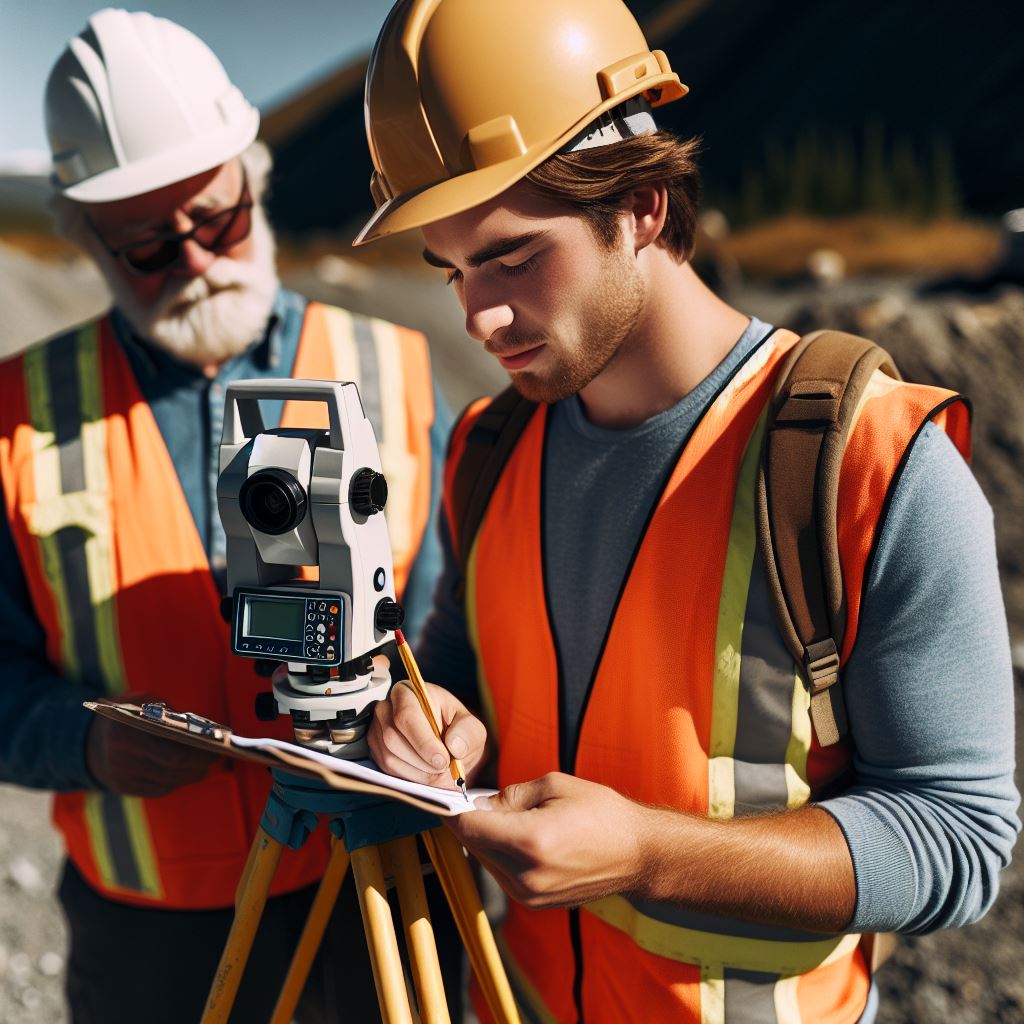Introduction
Surveyors play a crucial role in various industries as they measure and map land and property.
If you are interested in becoming a surveyor in Canada, this section will guide you through the process.
Navigating the intricate terrain of becoming a surveyor in Canada involves not only mastering the technical aspects of surveying but also developing a keen understanding of the legal and regulatory frameworks that govern this profession.
This comprehensive guide will delve into the educational pathways, practical experiences, and certification processes essential for carving out a successful career in surveying.
We will explore the latest advancements in surveying technology, ensuring you stay at the forefront of industry trends.
Moreover, the guide will shed light on the diverse specializations within the field, ranging from cadastral surveying to geodetic surveying, allowing you to tailor your career to your specific interests.
Insightful tips from seasoned professionals and real-world case studies will provide practical wisdom, guiding you through the challenges and triumphs of a surveyor’s professional journey.
Whether you are intrigued by the prospect of shaping urban landscapes or contributing to environmental conservation efforts, this guide will equip you with the knowledge and skills needed to thrive in this dynamic field.
Join us as we unravel the steps, intricacies, and opportunities that define the path to becoming a surveyor in the vast and captivating Canadian context.
Educational Requirements
In order to become a surveyor in Canada, there are certain educational requirements that need to be met.
These requirements ensure that individuals have the necessary knowledge and skills to perform the tasks required in this profession.
Below are the educational requirements to become a surveyor in Canada:
High school diploma or equivalent
The first educational requirement to become a surveyor in Canada is to have a high school diploma or an equivalent education level.
This provides a foundation for further studies in surveying.
Pursuing a post-secondary education in surveying or related field
After completing high school, individuals interested in becoming surveyors can pursue a post-secondary education in surveying or a related field.
This specialized education will provide them with the necessary theoretical and practical knowledge required in this profession.
Available educational programs in Canada
There are several educational programs available in Canada for individuals interested in pursuing a career in surveying.
These programs are offered by various colleges and universities across the country. Some well-known institutions offering surveying programs include:
- British Columbia Institute of Technology (BCIT)
- Northern Alberta Institute of Technology (NAIT)
- Southern Alberta Institute of Technology (SAIT)
- University of Calgary
- University of New Brunswick
- York University
These educational programs provide a comprehensive curriculum that covers various aspects of surveying, including land surveying, geodesy, photogrammetry, and remote sensing.
They also offer practical training through fieldwork, laboratory exercises, and internships to give students hands-on experience in real-life surveying situations.
In addition to the above-mentioned institutions, there are other colleges and universities in Canada that offer surveying programs.
Prospective students should research and choose the program that best suits their interests and career goals.
In short, the educational requirements to become a surveyor in Canada include having a high school diploma or equivalent, pursuing a post-secondary education in surveying or a related field, and exploring the available educational programs offered by various institutions across the country.
By fulfilling these requirements, individuals can gain the necessary skills and knowledge to excel in the field of surveying.
Read: Land Surveying: Key Tools and Technologies Used
Unlock Your Career Potential
Visualize a clear path to success with our tailored Career Consulting service. Personalized insights in just 1-3 days.
Get StartedLicensing and Certification
Overview of licensing requirements for surveyors in Canada
- Obtaining a license is necessary to work as a surveyor in Canada.
- Licensing requirements vary by province/territory, but common criteria include education and experience.
- Most provinces require completion of a recognized surveying program or equivalent educational qualifications.
- Experience requirements typically range from two to three years of practical experience in surveying.
- Applicants must also pass a licensing exam to demonstrate their competence in the field.
Examining provincial/territorial licensing boards
- Each province and territory in Canada has its own licensing board for surveyors.
- These boards have the authority to issue licenses and regulate the surveying profession.
- They ensure that professionals meet the required standards and adhere to ethical practices.
- Prospective surveyors should research the specific requirements and regulations of the licensing board in their region.
Steps to obtain professional certification
- Professional certification can further enhance a surveyor’s credentials and increase career opportunities.
- The Canadian Board of Examiners for Professional Surveyors (CBEPS) offers the Canadian Certified Survey Technician (CST) and the Canadian Land Surveyor (CLS) designations.
- To obtain the CST designation, applicants must pass the CST exam conducted by CBEPS.
- For the CLS designation, aspiring surveyors must complete a geomatics/geodetic engineering degree and meet other specified requirements.
- After meeting the educational and experience criteria, applicants must apply to the CBEPS for certification.
- The application process may include submitting transcripts, work experience records, and references.
- Once certified, surveyors can use the appropriate designation and gain recognition as qualified professionals.
By following these steps and obtaining the necessary licenses and certifications, aspiring surveyors can establish themselves as competent professionals in Canada’s surveying industry.
Read: The Daily Life of a Canadian Surveyor: An Insight
Building Practical Experience
Gaining practical experience is a fundamental step towards becoming a professional surveyor in Canada.
It not only enhances your skills and knowledge but also demonstrates your dedication and commitment to the field.
Importance of gaining hands-on experience in surveying
By actively seeking hands-on experience, you will develop the necessary practical skills that are invaluable for successful surveying projects.
Working alongside experienced professionals or participating in training programs will give you exposure to real-world challenges and help sharpen your problem-solving capabilities.
Ways to gain practical experience in the field
There are various ways to gain practical experience in the field of surveying.
You can start by seeking employment as a surveying assistant or technician, where you will work closely with experienced surveyors and learn from their expertise.
Volunteering for surveying projects with non-profit organizations or local government agencies is another effective method to gain practical experience while contributing to the community.
Joining surveying clubs or associations is highly recommended as well.
These organizations often offer training programs and practical workshops that allow you to further develop your skills.
Additionally, consider enrolling in part-time courses or pursuing a diploma or degree program in surveying or geomatics to gain a solid theoretical foundation alongside practical training.
Co-op programs offered by universities are an excellent way to gain hands-on experience while studying.
These programs provide opportunities to work on actual projects and collaborate with industry professionals.
It allows you to apply classroom knowledge in a real-world setting, preparing you for a successful career in surveying.
Overview of internships, apprenticeships, and entry-level positions
Internships, apprenticeships, and entry-level positions are also essential avenues to gain practical experience.
Internships provide temporary positions for students or recent graduates to obtain valuable hands-on training.
Apprenticeships, on the other hand, involve working under the guidance of a licensed surveyor to learn the trade from the ground up.
Entry-level positions provide opportunities to kick-start your career in surveying and often come with on-the-job training.
These positions may have different requirements, but they all serve as stepping stones towards becoming a professional surveyor.
The practical experience gained through internships, apprenticeships, or entry-level positions will open doors to further opportunities and advance your career in Canada’s surveying industry.
In fact, building practical experience is vital for aspiring surveyors in Canada.
By actively seeking opportunities to gain hands-on training and working with experienced professionals, you will develop the necessary skills and knowledge to excel in the field of surveying.
Whether through internships, apprenticeships, or entry-level positions, each step brings you closer to achieving your goal of becoming a successful surveyor in Canada.
Read: Essential Skills for Canadian Architects

Professional Development
Continuous learning and career advancement in surveying
- In order to succeed and excel as a surveyor in Canada, continuous learning and professional development is crucial.
- This field is constantly evolving, and staying updated with the latest developments is essential to stay competitive.
- There are numerous ways to continue learning as a surveyor, such as attending workshops, conferences, and seminars.
- These events provide opportunities to learn from industry experts, acquire new skills, and stay informed about advancements in technology.
- It is also advisable to read industry publications, research papers, and relevant literature to broaden knowledge and expertise.
- By consistently engaging in these learning opportunities, surveyors can expand their skill set and advance their careers.
Membership in professional surveying associations
- Joining a professional surveying association is highly beneficial for surveyors in Canada.
- These associations provide a platform for networking, knowledge sharing, and professional development.
- One of the most prominent associations in Canada is the Association of Canada Lands Surveyors (ACLS).
- ACLS offers various programs, events, and resources that support the growth and development of professional surveyors.
- It also provides opportunities for surveyors to connect with other professionals in the field and build valuable relationships.
- Being a member of such associations can enhance credibility, open doors to new opportunities, and contribute to professional recognition.
Importance of staying up-to-date with technological advancements
- Technology plays a vital role in the field of surveying, and staying up-to-date with advancements is crucial.
- Surveyors must embrace new technologies to improve their efficiency, accuracy, and overall quality of work.
- One significant technological tool embraced by surveyors is Geographic Information Systems (GIS).
- GIS enables surveyors to capture, store, manipulate, analyze, and manage geospatial data effectively.
- Other technological advancements, such as laser scanning and remote sensing, have revolutionized surveying practices.
- Surveyors who adapt to these advancements are at an advantage, as they can provide clients with more precise and comprehensive results.
- Keeping up with technological advancements may require attending training programs or seeking certifications.
- However, the investment in upgrading skills and knowledge will pay off in terms of career growth and increased marketability.
In essence, professional development is crucial for surveyors in Canada to thrive in their careers.
Continuous learning and staying updated with technological advancements are essential.
Joining professional surveying associations provides networking opportunities and access to valuable resources.
By investing in professional development, surveyors can enhance their skills, credibility, and overall success in the field.
Read: Diversity in Canada’s Architectural Sector
Employment Opportunities
The various sectors where surveyors work
- Construction Industry: Surveyors play a crucial role in construction projects, ensuring accurate measurements and providing site plans.
- Engineering and Infrastructure: Surveyors are involved in designing and building infrastructure projects such as roads, bridges, and pipelines.
- Geomatics and Geographic Information Systems (GIS): Surveyors use advanced technology to collect geographical data and create detailed maps.
- Land Development and Real Estate: Surveyors assist in land subdivision, boundary identification, and determining property values.
- Government and Public Sector: Surveyors are employed by government agencies to support land management and urban planning initiatives.
Overview of job prospects in Canada
Canada’s growing population and expanding infrastructure projects have created a strong demand for skilled surveyors.
- Job Stability: Surveyors enjoy a stable and secure career due to the ongoing need for their specialized skills.
- Salary Range: Salaries for surveying professionals in Canada can range from $50,000 to $120,000 per year, depending on experience and qualifications.
- Regional Variations: Employment opportunities may vary across provinces, with high demand in areas experiencing significant development.
- Industry Growth: According to government forecasts, the demand for surveyors is expected to increase steadily in the coming years.
Potential career paths and growth opportunities
- Registered Land Surveyor (RLS): After completing the required education and gaining practical experience, surveyors can become RLS-certified.
- Specialized Fields: Surveyors can specialize in areas such as hydrographic surveying, aerial surveying, or cadastral surveying.
- Management Positions: Experienced surveyors can advance to managerial roles, overseeing teams and coordinating projects.
- Consulting Opportunities: Surveyors often have the option to work independently or start their own consulting firms.
- Professional Development: Continuous learning and staying updated with advanced technologies can lead to career advancement and higher earning potential.
In a nutshell, surveyors in Canada have diverse employment opportunities in various sectors such as construction, engineering, geomatics, and government.
The job prospects are favourable, with stable career paths, competitive salaries, and anticipated industry growth.
As surveyors gain experience and expertise, they can explore specialized fields, management roles, or even start their own consulting firms.
Continuous professional development is crucial for long-term career growth in this dynamic field.
Salaries and Benefits
Average salary range for surveyors in Canada
- The average salary range for surveyors in Canada varies between $50,000 and $90,000 per year.
- The starting salary for entry-level surveyors is typically around $45,000 per year.
- Experienced surveyors with advanced certifications and years of experience can earn upwards of $100,000 per year.
Factors influencing salaries in the field
- Education and qualifications play a significant role in determining surveyors’ salaries.
- Specialization or expertise in a specific area of surveying can lead to higher pay.
- Location also affects salaries, as surveyors in urban areas tend to earn more than those in rural areas.
- Industry and employer size can impact salaries, with larger companies generally offering higher pay.
- Years of experience and job responsibilities also contribute to salary variations.
Benefits and perks commonly associated with surveying careers
- Healthcare and medical benefits are commonly provided by employers in the surveying industry.
- Retirement plans and pensions, such as the Canadian Pension Plan (CPP), are available to surveyors.
- Many companies offer paid time off, including vacation days, sick leave, and personal days.
- Surveyors often enjoy flexible working hours and the ability to work remotely.
- Professional development opportunities and training programs are offered to enhance surveyors’ skills.
- Some employers provide bonuses or profit-sharing programs to reward exceptional performance.
- Surveyors may have access to company vehicles or receive mileage reimbursement for travel to job sites.
- Employee assistance programs (EAPs) provide support for personal and professional issues.
- Some companies offer additional perks such as gym memberships, wellness programs, or tuition reimbursement.
Explore Further: Mech Engineers and the Auto Industry CA
Conclusion
Recap of the steps to become a surveyor in Canada:
- Complete a high school education with a focus on math and science.
- Earn a bachelor’s degree in geomatics engineering or surveying.
- Gain practical experience through internships or entry-level surveying jobs.
- Obtain a professional surveyor license by passing the necessary exams.
- Continuously update your skills and knowledge through professional development.
Becoming a surveyor in Canada requires dedication, hard work, and a passion for the profession.
It offers a rewarding career with opportunities for growth and advancement.
Remember that the journey may not always be easy, but perseverance and a strong work ethic will pay off in the end.
Surveying is a demanding profession that requires attention to detail, problem-solving skills, and the ability to work in various terrain and weather conditions.
Perseverance is key when facing challenges along the way. Passion for the work will fuel your motivation and drive to excel in the field.
Aspiring surveyors should stay committed, continue learning, and embrace the opportunities that come their way.
With the right education and experience, coupled with perseverance and passion, anyone can build a successful career as a surveyor in Canada.




